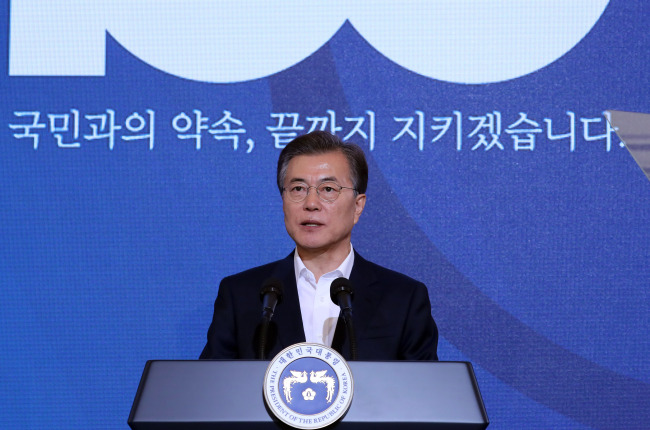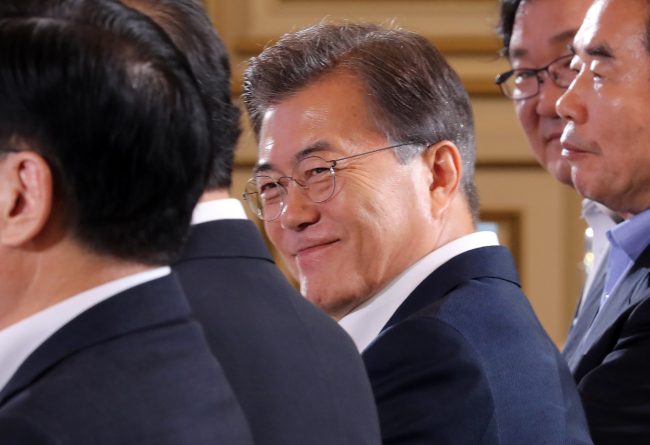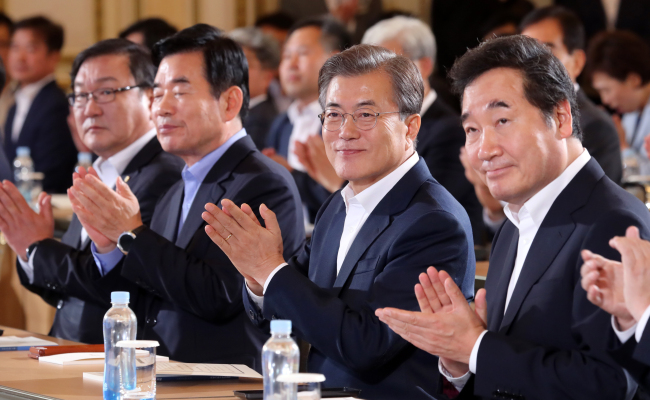President Moon Jae-in on Wednesday announced his administration’s five-year plan, presenting democracy and justice as overarching values.
“The five-year plans for state affairs announced today will be the blueprint and compass for a new Korea,” Moon said, unveiling five goals, 20 strategies and 100 tasks to overhaul all major aspects of the country.
 |
(Yonhap) |
In the plans, the Moon Jae-in administration set its vision to create a “people’s country, a just Korea.” In order to achieve the vision, goals concerning five major areas – political and social issues, economy, welfare, balanced regional development and defense and foreign affairs – have been set.
The five goals span 20 strategies, under which 100 major tasks are grouped together. The 100 tasks are further divided into 487 smaller tasks.
“The new government will continue the spirit of the candlelight revolution. Korea will be established as a just country whose people are the rulers, where unfair privileges, foul play and unfairness is removed, and (social) discrimination and disparity is resolved,” Moon said.
Moon also revealed that ways to finance the plans will be discussed this week, the plans will be fine-tuned by concerned ministries and the government will brief the public on the progress annually.
Many of the plans concerning political and social issues center on increasing transparency and communication with the public, elements considered severely lacking in the previous administration.
Related tasks, grouped together under the goal of creating a “government ruled by the people,” include increasing the transparency of government, and civil service’s personnel management, and improving human rights conditions.
 |
(Yonhap) |
The goals also include reforming the police, Ministry of Justice and its subordinate organizations, the National Intelligence Service and introducing a fairer tax system.
As part of the plans, the government plans to launch an independent anti-corruption body next year and to reorganize investigative powers of the police and prosecutors’ office. The anti-corruption measures will also see the establishment of a conference of concerned organizations to fight defense-related corruption.
On economic issues, the plans support Moon’s idea of “income-led growth,” with many of the tasks aimed at creating jobs and supporting small merchants and businesses.
Of the 26 economic tasks, eight concern job creation, while five – including bolstering fair competition and addressing large conglomerates’ shareholding structures – concern fair competition.
The economic plans also include creating 810,000 public sector jobs – one of Moon’s main election pledges – and the introduction of job-hunting subsidies, as well as increasing state organizations’ quota for hiring young adults to 5 percent from the current 3 percent.
The Moon Jae-in administration also plans to inject state funds into supporting the “fourth industrial revolution” and to boost subsidies for SMEs’ research and development, as well as for venture companies.
Along with economic plans, which include 129 projects under 26 tasks, welfare and social security issues take up a large part of the five-year road map.
 |
(Yonhap) |
Key welfare and safety goals include providing more child care support, increasing state housing and renovating the country’s disaster response system, as well as reviewing the four-rivers project and reducing dependence on nuclear power.
On the foreign policy and security front, the Moon administration will push for North Korea’s denuclearization and the establishment of a peace treaty in parallel, starting with the restart of regular inter-Korean dialogue on the military, economy and sports.
A key initiative is the signing of a new basic inter-Korean agreement built on past accords. But Cheong Wa Dae stressed it is a long-term objective to be accomplished under the proper conditions, mindful of the drawn-out gridlock and sour international sentiment toward a thaw with the recalcitrant Kim Jong-un regime.
With the alliance with the US remaining the mainstay of peninsular security, Seoul aims to fix a specific timeline for an early takeover of wartime operational control through consultations with Washington.
The OPCON transfer was initially set for 2015, but was delayed until the 2020s under President Park Geun-hye. Moon has pledged to complete the transfer within his term.
“We will accelerate preparations to retake OPCON at an early date, while resetting and improving the South Korean military’s core capabilities to steer the joint defense against North Korean nuclear and missile threats,” the text said.
Moon’s vision to build an inter-Korean economic community with a “New Korean Peninsula Economic Map” is to be sustained despite its challenges. It envisions formulating joint industrial zones and traffic networks along the eastern and western coastal areas including by reopening the now closed Kaesong industrial park and Mount Kumkang, which critics say would help fatten Kim’s coffers and may breach international sanctions.
Within the military, the government laid out reform plans under which the Joint Chiefs of Staff would transform into the tentatively named Joint Military Command and scale back the total number of troops to about 500,000 from the current 600,000.
The administration is seeking to raise by 2022 the salaries for rank-and-file soldiers to 50 percent of the legal minimum wage, which was recently settled on 1.57 million won ($1,400) a month for 2018.
It will also allow the soldiers to transfer their mandate service to college credits, while expanding the female workforce and improving their working conditions.
By Choi He-suk and Shin Hyon-hee (
cheesuk@heraldcorp.com) (heeshin@heraldcorp.com)







![[Exclusive] Hyundai Mobis eyes closer ties with BYD](http://res.heraldm.com/phpwas/restmb_idxmake.php?idx=644&simg=/content/image/2024/11/25/20241125050044_0.jpg)
![[Herald Review] 'Gangnam B-Side' combines social realism with masterful suspense, performance](http://res.heraldm.com/phpwas/restmb_idxmake.php?idx=644&simg=/content/image/2024/11/25/20241125050072_0.jpg)

